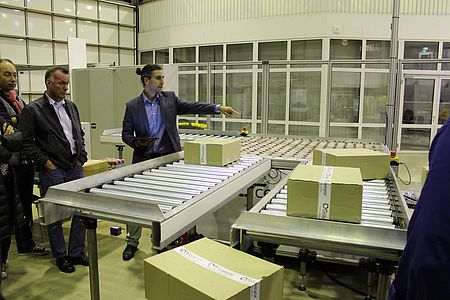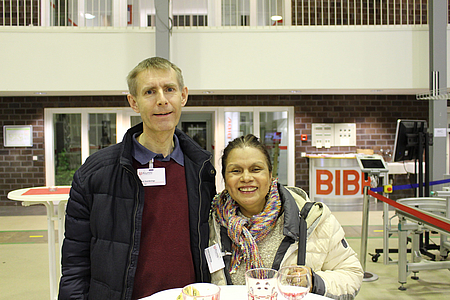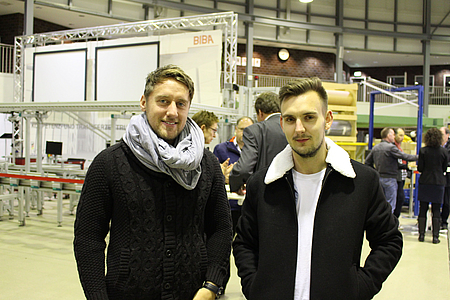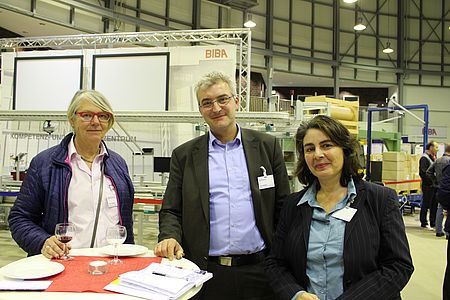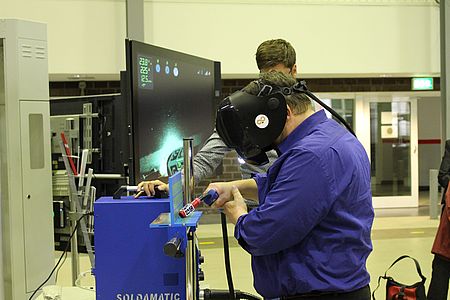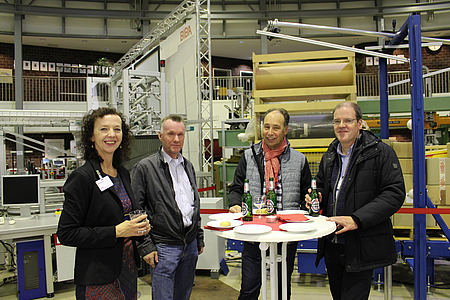[Translate to English:] Alumni im BIBA am 25. Oktober 2017
[Translate to English:] Impressionen des Abends
Networking at BIBA on October 25
A short introduction by Prof. Dr. Klaus-Dieter Thoben gave us an overview on the development, focus areas, and direction of BIBA over the last several years. The university-affiliated institute has been active in the surroundings of the University of Bremen for twenty years. Originating in Department 4 – Production Engineering, Process Engineering, and Mechanical Engineering, it provides room for a varied field of specialists, such as scientists from industrial engineering, system engineering, space engineering, and others. The department alone is home of various different institutes affiliated with the university. It was a major step from its foundation to the ‘Future Factory’ that it is today. BIBA, the Bremen Institute for Production and Logistics, was founded in 1981 and currently has 150 staff members. Basic funding is provided by the State of Bremen; research is funded externally. However, many research projects are also funded by the EU. The term ‘Industry 4.0’ is not new – but digitalization of information is still most important for developing current projects. ‘Extended Products’ is the term of the future. Complexity of processes in logistics centers, increasing demands for eco systems, and, above all, the fact that all aspects of transport and merchandise management are always connected with each other present the biggest challenges for IT, mechanical engineering, logistics, and the semi-structured complex processes of today. Therefore, difficulties have to be tackled creatively early on. One of BIBA’s strengths: advancing collaborative research between science and industry. Acquisition is made internationally. For example, cloud information with different scenarios in data exchange is installed in larger companies – smaller ones are usually not interested in such complex solutions. What is regularly needed are combined solutions from electrical engineering, communications engineering, and computer science with tools for production and logistics, for example in the sector of security. Prof. Thoben concluded: It is about humans first, then about qualification, organization, technology, process optimization, and only then computer science. After this theoretical introduction into the new form of service, the group of alumni split up into two teams. One group used VR (virtual reality) to learn how to weld without exposing oneself to danger, producing too much scrap, or requiring specific welding booths. This technique can be used by businesses and vocational schools to train their students and apprentices. It enables understanding the method and reduces the time to learn it. Virtual commissioning is ideal. The alumni were able to weld, look at the analysis of their work on the computer and evaluate it – and they could ask the professionals at BIBA their questions. The second team turned to the area of Robotics in a different section of the 500-square-meter ‘playing field’ and learned about the demands from package robots that can unload containers completely autonomously. Performance and flexibility were the key terms in this field. Sorting, forwarding, and selecting are done by means of omnidirectional drives. 180 motors are all individually controllable in free motion with QR codes or barcodes. Via a tablet computer, everything can be controlled for demonstration as well. We were also able to experience the omnidirectional drive that was part of our report in newsletter 4/2017). What fascinating solutions thanks to innovative and often playful ideas! The excitement for the possibilities and freedom in researching at BIBA came across very vividly during the event. We would like to thank the institute for the wonderful evening!


